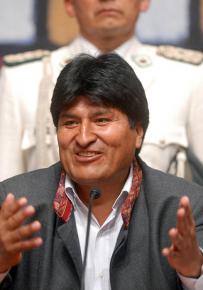Bolivia’s right pushes toward confrontation
looks at the results of a referendum on autonomy engineered by Bolivia's financial and agricultural oligarchy.
GRASSROOTS ORGANIZATION by the social movements and President Evo Morales' governing Movement Toward Socialism (MAS) party achieved a political victory in Sunday's referendum on autonomy for the regional government of Santa Cruz in Bolivia.
Early returns showed that pro-autonomy forces received between 75 and 80 percent of the votes cast in an event staged as a direct challenge to the authority of Bolivia's new constitution. But abstention rates ran high, averaging between 35 and 40 percent throughout the state. When added to the 20 to 25 percent of "no" votes and blank ballots, at least 50 percent of Santa Cruz voters rejected the autonomy statute.
MAS officials and Bolivia's principal social movements had called for abstention from the right-wing referendum. Further, the Bolivian National Elections Commission, the Organization of American States, Mercosur, the European Union and numerous other international groups previously denounced the referendum as illegal and unconstitutional.
Nevertheless, Santa Cruz Prefect (Governor) Rubén Costas and Civic Committee President Branco Marinkovic pressed ahead with the vote in an effort to legitimate the region's declared politics of separatism and division.

Bolivia's neoliberal right sought to use the referendum to block efforts by the Morales government to weaken the power of Bolivia's financial and agricultural oligarchy.
Ever since Morales' inauguration as Bolivia's first indigenous president in January 2006, political officials and chambers of commerce in the eastern departments of Santa Cruz, Tarija, Beni and Pando (known as the "half moon" or "media luna" region) have aggressively pursued tactics of delay and divide-and-conquer in order to protect the interests of rich landowners and gas moguls.
According the United Nations Development Program, 100 powerful families throughout the media luna own and control 25 million hectares of the most productive soil available. That is five times greater than the land owned by 2 million peasants who work small farms on poor and depleted soil in the region.
The "100 clans," as they are called by the left in Bolivia, have spread out from farming and now form an interlocking network of moneyed interests--a ruling class--centrally tied to agro-exports, local industry, natural resource exploitation (deforestation and hydrocarbons), transnational corporations (especially hydrocarbons), national and international finance, and the largest mass media organizations.
POPULAR RESISTANCE snatched Morales' apparent victory from the jaws of looming defeat. Grassroots politicking for abstention played an important role, as did large anti-referendum rallies in El Alto, La Paz and Cochabamba.
In Santa Cruz, residents who opposed the autonomy referendum faced off against authorities in the provinces of San Julián and Yapacaní in the wee hours of May 4. They destroyed ballot boxes and election forms, and went on to blockade the highway between Santa Cruz and Cochabamba.
Opposition to the referendum quickly spread to Montero and Cuatro Cañadas provinces, eventually reaching several neighborhoods of the city of Santa Cruz, including the poorer section known as Plan 3000.
As protesters took action, they frequently encountered pro-autonomy, semi-fascist groups of "civil guards" who function as the "shock troops" of the Santa Cruz Civic Committee. At least one death and 18 wounded resulted from the confrontations, according to first reports.
Anti-referendum protesters also claimed to have discovered ballot boxes pre-stuffed with "yes" votes at various locations. In one incident, seven people from Plan 3000 took samples of falsified ballots to show members of the international press. After leaving the press center, they were beaten by "civil guards," who also burned the protesters' car.
Morales and administration officials chose not to intervene militarily to stop the referendum from taking place. This was a good decision, for the moment, because the government has prepared neither itself nor the majority population for a head-on confrontation with Costas, Marinkovic and the 100 clans.
However, the Morales administration has merely continued its pattern of appeasing and placating the landed rich and the neoliberal bandits of the media luna--a pattern that began in the early days and persisted through the Constituent Assembly of 2007.
Morales, in effect, lucked out this time, since the vote tally in favor of autonomy in Santa Cruz can be offset by the abstention rate as each side spins the result for the media. At some point, however, a decisive confrontation with Bolivia's oligarchy must come.
The oligarchy aims at nothing less than a form of dual power. Whether such power is wielded de facto or constitutionally is less important to the oligarchy than its ability to resist agrarian reform and to control hydrocarbons.


